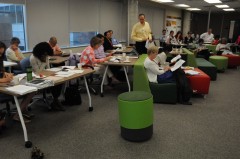Metropolis Professional Development (MPD) recognizes that participants come to its trainings with varied degrees of knowledge, experience and skills in the topics of migration and integration management. Furthermore, it recognizes that participants have different professional backgrounds and focus of work. With these differences in mind, the training sessions seek to develop, strengthen and/or complement each participant’s skills and knowledge through a series of interactive sessions led by professional facilitators, as well as engaging participants to share and contribute to their own learning. In this process, participants also count with the knowledge and expertise of renowned scholars, senior policy makers and practitioners. Indeed, each day, high level lectures will set the tone of the discussions and the personal and small-group work.

The guiding approaches to the training are based on Paulo Freire’s popular education and critical pedagogy and participatory adult education pedagogy. Both critical and participatory pedagogy are learner-centered approaches that emphasize the engagement of the learners as key factors in their own learning. Participants are “actors in the learning process.” To underscore this, the MPD training sessions, therefore, are not prescriptive of any particular solutions to improving migration and integration management. In fact, facilitators mentor and guide participants in coming up with their own approaches and solutions. In doing so, they make use of facilitation techniques such as Appreciative Inquiry process, Role Playing, Pro Action Café or Open Spaces.

To ensure the dynamism of the sessions as well as a good balance of backgrounds, the MPD trainings gathers between 20 and 25 participants.
The emphasis of the curriculum is focused on management over research. Although MPD trainings are rooted in empirical research, they are not academic in nature and are designed for those who are charged with managing these phenomena, either as officials of government, NGOs in the service provision sector, business, or otherwise. The training sessions not only enable participants to share their experiences and knowledge but facilitators assist participants in analyzing and building on their professional experiences to find commonalities and differences, to plan for action (implementation), and to reflect on the action. Sessions expose participants to information, best practices, tools and strategies, and invite participants to develop understandings through discussions and hands-on exercises. Sessions rely heavily on audio-visual materials, discussion and small-group work.

Ratna Omidvar – June 2014 Training